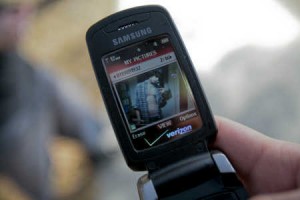 U.S. Rep. Anthony Weiner may not have broken any laws by texting lewd photos of himself to younger women he didn’t know.
U.S. Rep. Anthony Weiner may not have broken any laws by texting lewd photos of himself to younger women he didn’t know.
In many states, however, teens who send pictures of themselves to their own girlfriends or boyfriends can be prosecuted for child pornography.
Allyson Pereira calls that hypocrisy. She should know. She’s spent six years dealing with the consequences of “sexting” one topless image of herself to an ex-boyfriend.
Allyson was 15 at the time, and the boy said he’d date her again if she’d send him the photo. But he was playing her. According to Allyson, he sent the private image to his entire contact list.
For the next three years at Wallkill Valley Regional High School in northern New Jersey, she was bullied and ostracized. Paint cans were thrown in her family’s pool. A tire was rolled down their driveway, smashing a glass door to the house.
“It’s actually made me stronger,” she said in an interview with JJIE, “but there were times when I really was suicidal. If it hadn’t been for my family and one or two friends, I wouldn’t be here today.”
“I can’t even tell you what it was like to live with that,” her mother says. “These kids can be so cruel to each other.”
But Allyson and her family were afraid to report the situation to police because Allyson could have been prosecuted for sending child pornography — of herself.
In an effort to protect children, both Congress and state legislatures have passed tough criminal laws designating the electronic distribution of nude images of teenagers as child pornography and often requiring those convicted of “sexting” to be registered as sex offenders. The problem is that a net thrown by the legal system to catch adults who exploit children is now more effective at ensnaring children.
Most states now require youths who send nude or semi-nude images of minors to be criminally prosecuted. Alabama, Iowa, Massachusetts, New York, Pennsylvania and Wisconsin are among those where teenagers as young as 13 have been prosecuted or convicted for sexting.
One of those teens was Phillip Alpert of Orlando, Fla. At 3:28 in the morning after an argument with his 16-year-old girlfriend, Phillip, who had just turned 18, sent a semi-nude image of the girlfriend to her contact list. Her parents reported his actions to the police, who descended on his house with a search warrant.
Phillip faced 72 charges of various sorts, including the possession and distribution of child pornography. He was kicked out of school and, after pleading guilty, placed on probation for three years.
Most troubling of all, he’ll be listed as a sex offender until he’s 43. In Florida, that means he must tell the state when and where he moves; he can’t live near any schools, parks or playgrounds; and his offender’s status will show up on any Internet search of his name.

Excellent article… There have been two lawmakers caught and publically ousted for their behavior NEITHER OF THEM have been prosecuted under the laws THEY passed.
This is more than some double standard, this is like giving the ‘finger’ to the rest of us. I am disgusted and appalled by the behavior of our elected officials and believe that every last one of them needs to be fired in their next election.
Great article Ken. And, it is crazy that everyone knows about the pictures Rep. Weiner sent – but he’s not being charged with anything. Can we say double-standard?